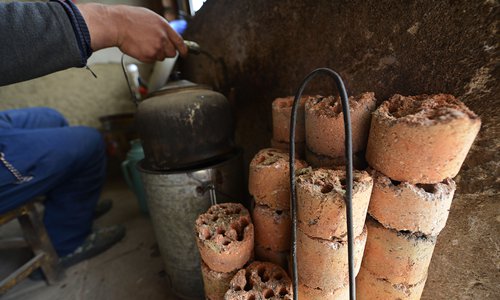
Center: A resident heats water on a coal-burning stove. Photo: VCG
Due to the lack of natural gas reserves, some rural regions no longer have any source of heating
Phasing out coal will benefit the environment in the long-term, but presently it has placed strains on China's gas supply
Experts agree that China's gas industry must be reformed, but disagree about how to do so
As yet another freezing winter currently descends on northern China, heating for many households in Hebei and other provinces in the region remains turned off.
Hebeinews.cn, the official website of the provincial government of Hebei Province, has recently been swamped with complaints from local residents about the lack of heating.
"We have had no heating since November 28. We consulted the gas company and they replied that gas is in short supply. No schedule about the restoration of gas was revealed," a resident from Shijiazhuang posted on the website.
"Many residents have started returning to coal briquettes or canned gas to cook," the resident goes on to say before desperately calling on the local government to solve the problem.
With winter setting in, such complaints also appeared in other northern provinces such as Shanxi and Shaanxi.
While a coal-to-gas transition project continues to be carried out throughout rural areas in these regions, many residents have literally been left out in the cold due to the lack of natural gas reserves or lagging gas pipeline construction.
In fighting against air pollution, in 2013 the Chinese government issued an action plan to reduce the concentration of fine particulate matter (PM) to a certain level by 2017 and push forward in all aspects of society the use of clean energy such as natural gas or electricity to replace coal.
The action plan is fast approaching its official deadline, and many cities across the country, including Beijing, Tianjin and Shijiazhuang have already set their goals and reinforced their efforts in transitioning from coal to gas.
As the project continues, however, the shortage of clean, natural gas in China has grown increasingly severe. Combined with the heavy demand for heating in the winter, unsuccessful or delayed coal-to-gas transitions in other regions across the nation are affecting ordinary people, which has outraged many and aroused fierce discussions about the fine balance between environmental protection and the livelihood of those who live in it.
While it seems sensible to replace coal with natural gas in order to curb pollution, experts say the local government should tackle the problem of China's reserves more responsibly and flexibly so as to avoid disturbing people's lives.
"Too hasty a transition from coal to gas is not necessarily a good thing," wrote Liu Huafang, a Beijing-based writer focusing on e-commerce, on his Sina Weibo. He called the transition in rural areas a "Great Leap Forward."
Winter temperatures in Hebei Province can reach lower than minus 10 degrees, and yet many residents still do not have any source of heating in their homes. "My house is like an ice cave. And burning coal is not allowed. How can we survive the winter?" one netizen who lives in Hebei wrote in a complaint on hebeinews.cn.


